On Wednesday, Ipswich residents visited me at Parliament to discuss the problems facing older carers – mostly parents whose adult “children” are unable to live independent lives and for whom there is no reasonable alternative to living at home. There are people in their 60s and 70s who are still caring for sons and daughters in their 40s, adults who may be physically strong but not mentally or psychologically capable of making daily decisions which the rest of us take for granted. Naturally, these parents are worried about what will happen to their charges once they are too frail to care for them any more.
Earlier in the day, I dropped in to an event run by Crisis, which is a charity providing support for rent deposits and other initial housing costs which are so often a barrier to homeless people and young people trying to rent their first independent place. And last month I had a meeting at the Chapman Centre with campaigners fighting for the right approach to homelessness in our town.
Ipswich needs more homes. We particularly need Council houses, so that they can be allocated to the local people with the greatest need, those residents can be secure in their tenancy, and the rents can be affordable. But there are various people in our community who need something a bit different – who need support in their accommodation because, for whatever reason, they aren’t able to completely look after themselves.
The last Labour Government introduced the “Supporting People” initiative for supported housing so that the extra resources could be made available for all those who needed extra help to live in their own homes – older people in sheltered accommodation, adults with severe disabilities or learning difficulties, young people in the care of the local authority, and so on. This programme recognised that there were vulnerable people who could not just live on their own without help, but also that they would be able to live fuller lives in their own homes rather than being left in institutions or other unsuitable accommodation. It helped provide the resources needed to make “care in the community” work, but it has been slashed by the Conservative government.
In November 2015 – in the first blizzard of Conservative austerity – George Osborne announced that housing benefit for social sector tenants would be capped at the same rate as private rented tenants. John Healey, Labour’s Shadow Minister for housing, exposed the devastating effect these changes could have on supported housing. Under pressure from Labour, the government’s ill-conceived and poorly planned cuts to supported housing have been subject to delays and back-tracking ever since they were first announced. Just this week, following more pressure from Labour, and facing yet another debate in the House of Commons that they were sure to lose, the Tories finally conceded that they would not impose the cuts on Housing Benefit for people in supported housing which they are imposing on all those in the private rented sector.
However, there are still serious questions about the viability of supported housing. Golden Lane Housing, who provide supported housing for people with learning disabilities, said “We had plans to raise over £100m through social finance but these have now been shelved due to the proposed changes”. Although the worst of the government’ cuts do not now look likely to come into force, the threat of the changes has already led to an 85% drop in new supported housing development.
We don’t need less supported housing – we need more. There is demand across the country for thousands of additional supported housing schemes including homelessness hostels, sheltered housing, specialist accommodation for former members of the armed forces and refuges for victims of domestic violence. Adults with learning difficulties, or autism, or having other needs for support, cannot be left solely in the care of increasingly aged parents.
All those most in need of housing have come under attack from this government, including slashing funding for new affordable homes, withdrawing housing benefit for under-21s and reductions in local housing allowance for private tenants which are making rents unaffordable for low income households.
We have won small concessions from this government, but we need a massive housing programme, starting now, building the houses people need in the places where they need them, including supported housing projects. Housing is in crisis, the lack of it is ruining people’s lives, and only Labour has the radical and comprehensive plans necessary to solve the problem.
